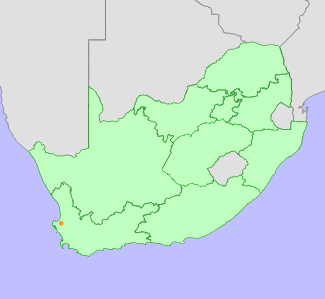|
Scientific Name | Freylinia visseri Van Jaarsv. |
Higher Classification | Dicotyledons |
Family | SCROPHULARIACEAE |
Common Names | Sandveld Honey-bells (e) |
National Status |
Status and Criteria | Critically Endangered B1ab(ii,iii,iv,v)+2ab(ii,iii,iv,v); C2a(i,ii); D |
Assessment Date | 2021/01/21 |
Assessor(s) | E.J. van Jaarsveld, D. Raimondo & I. Ebrahim |
Justification | A very rare, long-lived resprouter historically known from two localities. One subpopulation was lost to wheat cultivation in 1954. The other known subpopulation was ploughed in 2016 for Rooibos tea cultivation. Only 15 mature individuals are left in the wild. The number of mature individuals has declined from 50 plants in 1992 to 15 plants in 2020. It therefore qualifies as Critically Endangered under criteria B, C and D. |
Distribution |
Endemism | South African endemic |
Provincial distribution | Western Cape |
Range | This species occurs in Velddrif and Hopefield in the Western Cape, South Africa. |
Habitat and Ecology |
Major system | Terrestrial |
Major habitats | Saldanha Flats Strandveld, Hopefield Sand Fynbos |
Description | Plants grow in deep coastal sands in Sandveld vegetation. |
Threats |
| Agriculture (wheat farming and potato farming) is a severe past and present threat. Only one of two known historical subpopulations remains. Wegloopersheuwel is a historic record which has now been ploughed. The only known subpopulation at Steenboksfontein was ploughed in 2016 for Rooibos tea cultivation. It had a population of less than 50 individuals, on an island patch between wheat fields and cattle pasture. The farmer had intentions to plough the site to plant potatoes (D. Raimondo pers. comm. with farmer 2005). The future of the species at this site is uncertain. CREW visited the Steenboksfontein site in 2020 and 15 plants had resprouted but occur in a rooibos tea cultivated field. Several surveys have been done on neighbouring farms and no other subpopulations have been found thus far. |
Population |
The only known subpopulation is currently at the Steenboksfontein farm where it was ploughed up in 2016. 15 plants have resprouted and this species is at high risk of extinction. Several surveys have been conducted in adjacent areas with similar habitats. In the past CREW has monitored this population several times and it has declined from ± 50 plants in 2006 when it was first monitored to between 26 and 30 plants in 2009. When it was ploughed in 2016 we suspected that the population was extinct but fortunately 15 plants resprouted. A second historically known subpopulation was lost to plouhging 1954, it was reintroduced at this site and while 12 plants survive from the reintroduction monitoring in 2023 indicate that no plants have yet recruited and so this reintroduced subpopulation is not considered when calculating population size. The population trend is declining.
|
Population trend | Decreasing |
Assessment History |
Taxon assessed |
Status and Criteria |
Citation/Red List version | | Freylinia visseri Van Jaarsv. | CR D | Raimondo et al. (2009) | | Freylinia visseri Van Jaarsv. | Endangered | Hilton-Taylor (1996) | |
Bibliography |
Goldblatt, P. and Manning, J.C. 2000. Cape Plants: A conspectus of the Cape Flora of South Africa. Strelitzia 9. National Botanical Institute, Cape Town.
Hilton-Taylor, C. 1996. Red data list of southern African plants. Strelitzia 4. South African National Botanical Institute, Pretoria.
Manning, J.C., Maluleke, R., Ebrahim, I. and Helme, N.A. 2021. The genus Freylinia Pangella ex Colla (Scrophulariaceae: Teedieae): a re-assessment of the systematics and conservation status. South African Journal of Botany 142:352-369.
Raimondo, D., von Staden, L., Foden, W., Victor, J.E., Helme, N.A., Turner, R.C., Kamundi, D.A. and Manyama, P.A. 2009. Red List of South African Plants. Strelitzia 25. South African National Biodiversity Institute, Pretoria.
|
Citation |
| van Jaarsveld, E.J., Raimondo, D. & Ebrahim, I. 2021. Freylinia visseri Van Jaarsv. National Assessment: Red List of South African Plants version 2024.1. Accessed on 2025/12/13 |
 Comment on this assessment
Comment on this assessment

